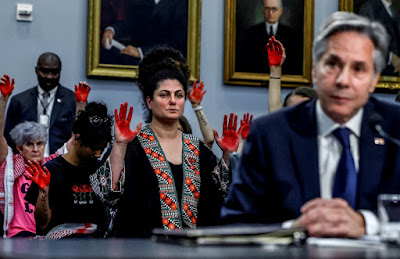In contrast to a similar ruling in March 2022 where the ICJ ordered Russia to stop its military actions in Ukraine, the Biden administration did not issue a public statement regarding the Israel ruling. While the State Department acknowledged the ICJ's role in peaceful dispute resolution under the U.N. Charter and welcomed the order directed at Russia, it refrained from drawing parallels between the two situations. The administration emphasized that the conflict in Israel began with an attack by a terrorist group, unlike Russia's unprovoked invasion of Ukraine.
Instead of issuing a statement on the Israel ruling, the National Security Council instructed spokespersons to briefly respond to inquiries by reiterating their consistent stance on Rafah. This position asserts that Israel's operation in Rafah aims to eliminate remaining Hamas combatants while minimizing harm to civilians and rescuing around 100 Israeli captives. However, this viewpoint contradicts the ICJ's perspective that Rafah signifies a significant shift since its previous warning earlier this year about potential genocide risks in Gaza.
Although the ICJ lacks enforcement mechanisms for its orders and requires approval from the U.N. Security Council where the U.S. holds veto power, some legal experts consider the order non-binding until a comprehensive evidentiary hearing occurs. Despite its limited immediate impact, the ruling contributes to Israel's increasing isolation and raises concerns about the U.S.' alignment with international opinion.
Harold Hongju Koh, an international law professor at Yale Law School and former State Department legal adviser, highlighted the negative implications of this development, emphasizing the risk of the U.S. being seen as complicit in illegal actions. Dissenting votes on the court came from Julia Sebutinde and Israel's Aharon Barak, with Barak arguing that there is no evidence of genocidal intent by Israel and pointing out that Hamas initiated hostilities with its attack on Israel. However, several nations, including key European Union members, had already urged Israel to halt its offensive in Rafah before the ICJ ruling due to concerns about strains on their relationship with Israel if the operation continued.
This decision was made following a week where global disapproval of Israel reached its peak. The prosecutor of the International Criminal Court, a treaty tribunal that neither the United States nor Israel is part of, called on the court to issue arrest warrants for Israeli Prime Minister Benjamin Netanyahu and Defense Minister Yoav Gallant if they enter any of its 124 member nations. Three European countries - Norway, Spain, and Ireland - announced their intention to join the 140 countries that already recognize Palestine as a state.
The situation in Gaza has escalated to a humanitarian crisis, with international organizations and officials expressing grave concerns over the impact of the Israeli offensive on the civilian population. Martin Griffiths, the U.N. undersecretary general for humanitarian affairs, described the situation as a tragedy beyond words, with over 800,000 people displaced and essential aid cut off.
Despite initial claims of a limited operation, the U.S. administration has acknowledged mounting worries about the dire consequences of the Rafah offensive. David Satterfield, a State Department adviser, highlighted the challenges of providing humanitarian support to the displaced population and the logistical obstacles posed by the ongoing conflict.
Israel's seizure of the Rafah crossing has severely disrupted aid delivery to southern Gaza, prompting President Biden to seek assistance from Egyptian President Abdel Fatah El-Sisi. While temporary measures are being taken to address the immediate needs, the underlying political dynamics and military escalation continue to hinder efforts to alleviate the crisis.
Efforts to broker a temporary truce with Hamas and increase humanitarian aid have faced setbacks, as negotiations between conflicting parties have stalled. CIA Director William J. Burns has engaged in diplomatic efforts to revive the peace initiative, but concrete outcomes from these talks remain uncertain amid the escalating conflict in Gaza.
The international community is facing a critical moment that demands urgent action to address the deepening humanitarian crisis in Gaza and prevent further escalation of violence.

